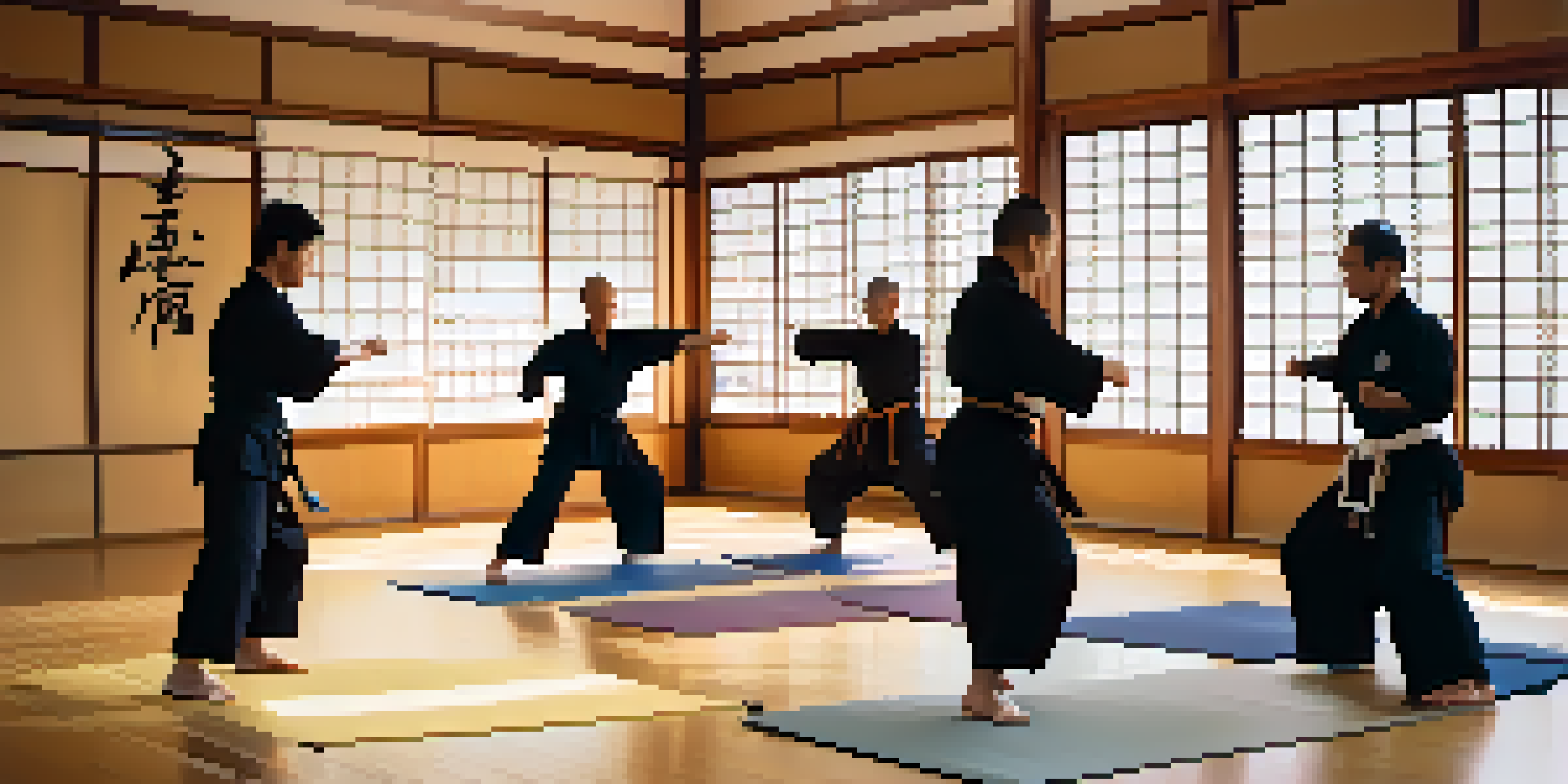Martial Arts and Stress Management: A Psychological Study

Understanding Stress and Its Impact on Mental Health
Stress is a natural response to challenges, but when it becomes chronic, it can significantly impact mental health. Many of us experience stress in various forms, whether from work, relationships, or daily responsibilities. Understanding how stress affects us can be the first step toward managing it effectively and improving our overall well-being.
The greatest weapon against stress is our ability to choose one thought over another.
Psychological studies show that prolonged stress can lead to anxiety, depression, and even physical health issues. For instance, when we remain in a high-stress state, our bodies release cortisol, which can affect everything from our immune system to our mood. Recognizing these effects can motivate individuals to seek healthier coping mechanisms.
This is where martial arts come into play. They offer not only physical benefits but also mental and emotional support, providing a holistic approach to stress management. Let's explore how these ancient practices can help us combat modern stresses.
The Role of Martial Arts in Reducing Stress
Martial arts encompass various disciplines, including karate, judo, and taekwondo, each focusing on different techniques and philosophies. What unites them is their emphasis on discipline, focus, and mindfulness, all of which are essential for managing stress. By training in martial arts, practitioners learn to channel their energy more productively.

Research indicates that engaging in physical activity, such as martial arts, can significantly reduce stress levels. The practice not only provides an outlet for pent-up emotions but also encourages the release of endorphins, the body's natural mood lifters. This can lead to improved mental clarity and a sense of calm.
Martial Arts Enhance Mental Resilience
Training in martial arts helps individuals build resilience by facing physical and mental challenges, which equips them to handle stress more effectively.
Moreover, martial arts training often includes breathing exercises and meditation techniques that further enhance mental resilience. This combination creates a comprehensive approach to stress management, allowing individuals to feel more centered and in control of their emotions.
Psychological Benefits of Martial Arts Training
Participating in martial arts can lead to numerous psychological benefits, such as increased self-esteem and confidence. As individuals progress in their training, they often experience a sense of achievement, which can counteract feelings of inadequacy that stress may provoke. This boost in self-confidence can ripple into other areas of life, creating a more positive outlook overall.
It is not the load that breaks you down, it’s the way you carry it.
Additionally, martial arts foster a sense of community and belonging. Many practitioners find camaraderie and support among fellow students, which can be incredibly beneficial for mental health. This social aspect can alleviate feelings of isolation that often accompany stress.
As students learn to conquer physical challenges, they also develop mental toughness, which is crucial for managing life's inevitable stressors. This resilience is not only important in the dojo but also translates to everyday situations, empowering individuals to handle stress more effectively.
Mindfulness and Focus in Martial Arts Practice
One of the core principles of martial arts is mindfulness, which involves being present in the moment. This practice can be a powerful antidote to stress, as it encourages individuals to focus on their breath, movements, and surroundings rather than worrying about past or future events. Mindfulness helps create a mental space where stressors can be assessed and managed more effectively.
Many martial arts incorporate meditation and breathing exercises that enhance this mindfulness. For instance, practitioners may spend time in a meditative state before or after training to center their thoughts and release tension. This practice can lead to a calmer mind and greater emotional stability.
Mindfulness Reduces Stress Levels
Practicing mindfulness through martial arts encourages a focus on the present moment, helping to alleviate stress and create mental clarity.
Furthermore, the focus required in martial arts training promotes mental clarity. By concentrating on specific techniques or movements, individuals can temporarily shift their attention away from stressors, providing a mental reset that can be refreshing and rejuvenating.
Physical Activity and Its Connection to Stress Relief
The link between physical activity and stress relief is well-documented. Engaging in martial arts provides a vigorous workout that helps release tension stored in the body. This physical exertion can lead to a significant reduction in stress hormones, making one feel lighter and more energized.
Moreover, martial arts training often involves rigorous routines that challenge the body and mind. This not only improves physical fitness but also serves as a distraction from daily stressors. When individuals are fully engaged in a training session, they are less likely to dwell on worries or negative thoughts.
Additionally, the sense of accomplishment that comes from mastering new skills in martial arts can further enhance one’s mood. Each new belt or technique learned can be a reminder of personal growth, fostering a positive mindset that helps combat stress.
Building Resilience Through Martial Arts Training
Resilience is the ability to bounce back from challenges, and martial arts training is an excellent way to cultivate this trait. By consistently facing physical and mental challenges in training, practitioners learn to persevere through adversity. This resilience can translate to everyday life, making it easier to cope with stressors.
The structured environment of martial arts classes also encourages goal setting and achievement. As students set and reach their goals, they develop a growth mindset that views challenges as opportunities rather than obstacles. This shift in perspective is crucial for managing stress effectively.
Community Supports Mental Well-Being
The sense of camaraderie found in martial arts fosters a supportive community, which can alleviate feelings of isolation and enhance overall mental health.
In essence, martial arts teach individuals that setbacks are a part of the journey. This understanding helps in developing a more adaptable approach to life’s stresses, providing tools to face them head-on with confidence and determination.
Conclusion: Integrating Martial Arts into Your Life
Incorporating martial arts into your routine can be a transformative experience for stress management. Whether you choose to join a local dojo or practice at home, the benefits of martial arts extend far beyond physical fitness. The mental and emotional advantages can significantly improve your overall quality of life.
As you embark on this journey, remember that progress takes time. Each small step in your training can lead to major improvements in how you handle stress and navigate life's challenges. Celebrate your achievements, no matter how minor they may seem.

Ultimately, martial arts offer a holistic approach to stress management that combines physical activity, mindfulness, and community support. By embracing these practices, you can cultivate a more balanced and resilient mindset that serves you well in all aspects of life.